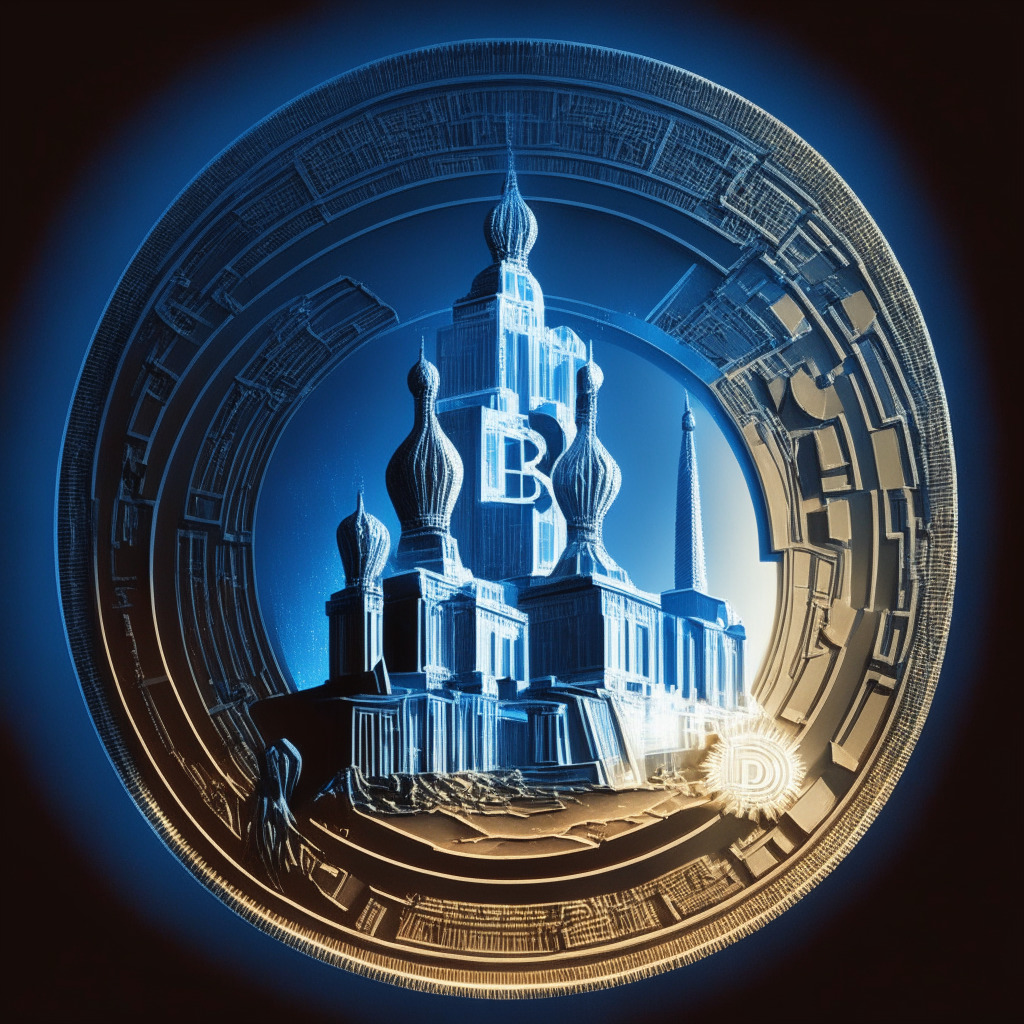Russian entrepreneurs aim to use “digital assets” and a “unified digital currency” for trade with BRICS and other nations. The idea of utilizing digital financial assets (DFAs), which may encompass digitized commodities, CBDCs, digital securities, cryptoassets, and stablecoins, in international payments is garnering attention. The possibility of creating a unified digital currency for cross-border transactions is also being evaluated.
Search Results for: Bank of Russia
The Emerging Digital Ruble: Potential Transformation in Russia’s Banking Landscape
Anatoly Aksakov, head of Russia’s State Duma financial committee, predicts a reduced role for traditional banks as the Central Bank Digital Currency (CBDC), the digital ruble, gains adoption. Aksakov urges banks to align their infrastructure with blockchain technology to leverage CBDC’s financial capabilities.
Transforming Banks: How Russia’s Digital Ruble May Redefine Traditional Banking Structures
Anatoly Aksakov, head of Russia’s parliamentary financial committee, suggests a future where blockchain and Central Bank Digital Currencies (CBDCs) could erode traditional banking structures, with the digital ruble leading the way. Banks risk being marginalized unless they adapt to this new digital financial landscape.
Digital Ruble Trial: Unveiling Russian Banks’ Apprehensions and Expectations
In a climate of anticipation, Russian banks, including Sberbank and Tinkoff Bank, express apprehension towards Central Bank’s digital ruble trial. With last-minute exist from the pilot and hesitation from the Association of Banks of Russia (ASROS), questions emerge about the future of Central Bank Digital Currency (CBDC) ahead of a substantial meeting.
Decentralization Versus Sanctioned Russian Banks: The P2P Dilemma in Crypto Exchanges
Crypto exchanges including OKX and Bybit have delisted Russian banks Tinkoff and Sberbank, due to Western sanctions following the Ukraine invasion. Despite this, the decentralized nature of P2P transactions makes complete enforcement challenging. The delistings highlight the growing reliance on cryptocurrencies amid Russia’s economic instability due to these sanctions.
Removing Sanctioned Russian Banks from Crypto Exchanges: A Double-Edged Sword for Global Compliance
Crypto exchanges OKX and ByBit have excluded sanctioned Russian banks, including Tinkoff Bank and Sberbank, from their payment options. Despite their removal, private transactions through these banks continue. The development highlights the friction between user services and adhering to international financial regulations in the crypto industry.
Binance’s Russian Rumble: Gearing Crypto Towards Regulatory Compliance or Decoupling From Traditional Bank Partners?
“Binance terminated its relations with five Russian banks amidst a system upgrade aimed at strengthening compliance with regulatory norms. This move brings into question the reliability of digital currencies as a stable transfer medium, highlighting the often complicated relationship between cryptocurrencies, regulatory compliance and traditional banking systems.”
Testing the Digital Waters: Russia’s Central Bank Propels CBDC Projects Amid Skepticism
“The Russian banks MTS and PSB are testing the digital ruble, aiming for a national rollout between 2025-2027. With real-world applications like PSB’s digital wallet and promising transaction fees, skepticism still surrounds the quick adoption of this Central Bank Digital Currency (CBDC).”
Navigating the Digital Ruble: Russian Banks Seek Clarity Amid Crypto Confusion
The Association of Russian Banks (ARB) is seeking clarity from Russia’s Central Bank on the eminent launch of Central Bank Digital Currency (CBDC), or digital ruble. In response to rising citizen apprehension, ARB is lobbying for specific regulations, such as prohibiting forced creation of digital ruble wallets and caps on digital ruble operator tariffs. However, ambiguity abounds regarding CBDC’s definition and potential global compatibility.
Digital Rouble: Boon for Retailers, Bane for Banks? The Debate on Russia’s Virtual Currency Saga
Russia’s parliament voted in favor of the “digital rouble” bill, moving towards a digitized financial infrastructure. While retail businesses expect profit, concerns about potential bank losses over the rapid transition to digital money have emerged. A country-wide rollout is planned for 2025-27, marking a significant point in Russia’s financial growth.
Groundbreaking Crypto Payments Pilot by Russian Megabank: Pros, Cons, and Main Conflicts
Russian megabank Rosbank, in partnership with B-Crypto, has launched a groundbreaking cross-border crypto payments pilot, streamlining international transactions for companies. The initiative encounters potential roadblocks, such as liquidity concerns and varying global stances on digital currency regulation, making the future of cross-border crypto payments uncertain.
Cryptocurrency Debate in Russia: Central Bank’s Ban vs Finance Ministry’s Regulation Approach
In Russia, cryptocurrencies are considered too risky for most but suitable for professional investors, according to Ivan Chebeskov, director of the financial policy department at the Finance Ministry. While acknowledging the high-risk nature of cryptocurrencies, Chebeskov emphasized their potential for investment. Tensions arise between the Central Bank’s focus on banning cryptocurrencies and the Finance Ministry’s push for regulation and taxation, resulting in an uncertain future for Russia’s crypto market.
Russian Bank Profits Soar in 2023: Breaking Records or Facing Sanctions Impact?
The Central Bank of Russia forecasts potential record-breaking profits for Russian banks in 2023, despite the 2022 challenges from unprecedented sanctions. This optimism follows a record quarterly profit of 881 billion rubles in Q1 2023, encouraging updated predictions from the National Credit Ratings agency. However, caution is advised due to ongoing impact from sanctions, economic conditions, and geopolitical events.
Binance Exodus: Why Russian Clients are Migrating en Masse to CommEx and Other Platforms
“Binance’s Russian users are progressively moving to new platforms including CommEx and ByBit, evident from decreased p2p transactions. While the migration is linked to US regulatory pressures, the change may indicate a strategic rebranding for more compliant user interaction in crypto market scenarios.”
Russian Firms Take Leap into Future with Adoption of Digital Ruble
Russian firms are adopting the central bank digital currency (CBDC), the digital ruble. Sirius Innovation Science and Technology Center and Rostelecom are pioneering this journey with their digital wallets, highlighting the practical application of this currency. However, this new model poses challenges for traditional financial institutions, and concerns remain about security and potential economic disruption.
Brazilian Bank Bet on Bitcoin: Major Shift or Mining Misstep in Kazakhstan?
“BTG Pactual, a major Brazilian investment bank, acquired a Bitcoin-friendly brokerage, Orama DTVM, aiming to enhance its digital operations. Meanwhile in Kazakhstan, high energy taxes targeted at crypto miners are destabilizing its Bitcoin mining industry. These contrasting scenarios highlight the shifting blockchain landscape worldwide.”
Russian Legislator Predicts Global Foray of Digital Ruble by 2025, Possible Shift in International Trade
A high-ranking Russian legislitor, Anatoly Aksakov, predicts that domestic corporations will utilize the nation’s digital ruble, a Central Bank Digital Currency (CBDC), by 2025, especially in Latin American nations. He also suggested potential usage could transform “mutual settlements” among these nations.
Rosbank’s Bold Endeavor: Embracing Digital Ruble Amidst Security Concerns and High Costs
“Rosbank, a trailblazer in the digital currency revolution, invested $1.6 million on integrating its systems with the digital ruble merely two months into the CBDC pilot. Emphasizing on secure transactional gateways, engaging complex cryptography solutions, and investing in specialized expertise, Rosbank stands resolved to overcome challenges of safety concerns, technological hurdles, and costly investments in this digital financial infrastructure.”
Binance Sheds Russian Operations: A Smooth Transition or Stumbling Block for Global Crypto?
“Binance, a leading cryptocurrency exchange, has sold its entire Russia business to CommEX. Its chief compliance officer states operating in Russia wasn’t in line with Binance’s compliance strategy. Similarly, the Swiss bank, Hypothekarbank Lenzburg now trades digital securities types on the blockchain-rooted platform, SDX.”
Diving into Russia’s Digital Ruble Debate: Opportunity or Devastating Risk?
“Russia’s active consideration of a Central Bank Digital Currency (CBDC) is encountering challenges including potential rate increases and withdrawal of major backers. Despite concerns, observers remind that cautious innovation is needed as the future of money moves increasingly towards digitization.”
The Digital Ruble: A Splash in the Global Financial Landscape or Russia’s Field to Plow?
“Russia’s Central Bank Digital Currency (CBDC) – the digital ruble – can play a significant role in curbing black market dollar trading, says former government official, Sergei Kalashnikov. It could minimize the chance of official currency entering the black market, adjust ruble’s value and impact dollar’s growth against it.”
Exploring the Probability of Marking Digital Ruble Tokens: A Double-Edged Sword for Russian CBDC
The Russian Central Bank potentially explores “marking” digital ruble tokens to track CBDC transactions, allowing close monitoring of funds usage. This suggests super-traceable tokens could be a reality soon, although there are cautionary notes around the required balance between regulation and autonomy in digital currency.
Navigating Digital Ruble Tokens: Russia’s Potential Game-Changer with Associated Risks
The Central Bank of Russia has limited digital ruble wallets to a maximum of 300,000 rubles per month to maintain market stability. However, suggestions have been made to remove this cap for non-Russian investors to facilitate foreign investment in Russia and simplify the purchase of Russian digital financial assets. This decision reflects the growing adoption of digital currencies globally.
The Impending Role of Blockchain: Will Digital Currencies Supersede Banks?
Russian legislator, Anatoly Aksakov, suggests the role of banks might diminish with advancements in blockchain technology, especially with the advent of the digital ruble. This technology presents a potential competitor to digital assets, raising concerns about financial stability. Aksakov believes this could render traditional banking obsolete, replacing human decision-making with automated actions.
Future of Transactions: A Russian Salon Charts New Course with Digital Ruble Payment
A beauty salon in Yekaterinburg, Russia, recently accepted its first digital ruble payment, pioneering the use of Russia’s Central Bank Digital Currency (CBDC) in the commercial sector. This case has sparked optimism that digital currency could offer unique payment solutions, even in areas with limited or no internet access.
Fostering the Future with CBDCs: Bank of China and Meituan Go Beyond E-Commerce
“Bank of China and Meituan are strategically collaborating to boost their Central Bank Digital Currency (CBDC) capabilities, venturing into CBDC-powered corporate services and potential offline and non-smartphone accessible use of the digital yuan. Despite the promising blockchain future, hurdles like digital divide, regulatory issues, and security concerns could arise.”
Binance’s Existential Crisis: Will the Crypto Giant Exit Russia Amidst Growing Legal Woes?
“Binance, the leading crypto exchange, is considering an absolute exit from Russia amid increasing Western sanctions. This comes after allegations of enabling transactions related to sanctioned Russian banks, escalating global legal issues, and potential indictments for possible infringement of anti-money laundering laws.”
Binance Regulations and Its Impact on Russian Cryptocurrency Traders: An Analytical Perspective
“Binance introduces new P2P trading restrictions specifically targeting its Russian clients, limiting them to only using the Russian ruble. While narrowing choices, this strengthens local control over RUB in the Russian crypto sphere. However, Russians abroad face difficulties as their usage of other currencies has been banned on the platform.”
Digital Ruble Scams Surge in Russia: A Cautionary Tale for the Global CBDC Movement
Scammers capitalizing on Russian citizens’ unfamiliarity with the Central Bank Digital Currency (CBDC) or digital ruble, are sending false emails and directing individuals to phishing sites to steal personal and financial data. The lack of understanding around CBDCs potentially hampers the digital ruble’s mass adoption, highlighting the need for comprehensive education.
Binance and the Minefield of Sanctions: Navigating the Russian Crypto Landscape
“Binance is under scrutiny for potential ties with five sanctioned Russian banks, raising questions about compliance and potential sanctions violations. Critics claim Binance facilitated ruble trades and peer-to-peer transactions with these banks. However, Binance denies these allegations, stressing adherence to international sanctions rules.”
Banking on the Digital Ruble: Heralding a New Era or Stoking Controversy?
The Russian Central Bank’s proposal classifies the digital ruble, as a “high-quality liquid asset”. This could usher a dramatic reconfiguration of how financial institutions perceive and maintain liquid assets, potentially revolutionizing cross-border payment methods. However, this shift is viewed with apprehension among commercial banks.
Unraveling Russia’s Digital Ruble: Combatting Corruption or Dodging Sanctions?
“The adoption of blockchain technology, like Russia’s digital ruble, offers potential to combat corruption by shrinking the shadow economy. It provides transparency in transactions and the possibility of reducing grey economy risks. Special offline wallets also allow it to reach areas where the internet hasn’t yet penetrated.”































